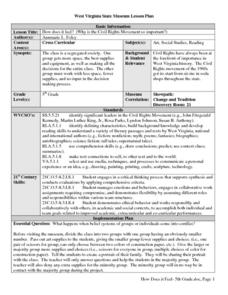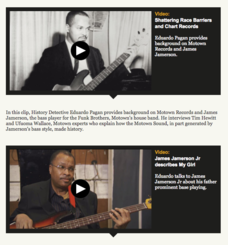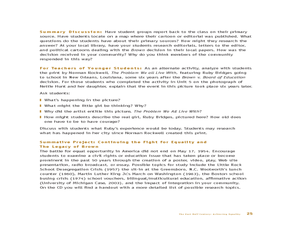Curated OER
"I Have a Dream"
Students examine the role Martin Luther King Jr. played in America's history and what life was like in the 1960's. They watch and discuss an online video about the childhood of Martin Luther King, Jr. and the holiday enacted in his...
Curated OER
How does it feel? Why is the Civil Rights Movement so Important?
Fifth graders study the Civil War. In this US history lesson, 5th graders simulate what life was like during the Civil War by having two groups with one group given more materials than the other group. Students then draw a portrait of...
Curated OER
Martin Luther King Day
Students access a varitey of Martin Luther King, Jr. themed websites. They locate information about Dr. King and his leadership in the American civil rights movement. They take a virtual tour of his birth home and view photographic...
PBS
Racial Equality: How Far Have We Come and How Far Do We Have To Go?
Is everyone treated fairly in America? The culminating fifth lesson from a series of five has pupils explore racial inequalities from the 1960s and decide whether or not society has changed over time. The lesson comes with a speech from...
Curated OER
Black Separatism or the Beloved Community? Malcolm X and Martin Luther King, Jr.
High schoolers interpret historical evidence presented in primary and secondary resources. For this African American history lesson, students compare and contrast the tactics employed by Malcolm X and Martin...
Curated OER
City Desk with Malcolm X
High schoolers view a film about civil rights and the role Malcolm X played in the civil rights movement. They create a timeling about the events that occured from segregation to integration. They discuss discrimination as well.
Curated OER
In the Struggle for Equality and Justice for All
Students focus on the struggle for minorities rights. They describe the civil rights movement of the late 1950's and the 1960's. They trace the roots of the movement in the second-class treatment accorded many black Americans and...
Curated OER
20th Century Civil Disobedience
Students write from varying perspectives in the American South about the civil rights movements in the 1950s. In this civics lesson, students view video clips and take notes. Students discuss the film and listen to a lecture on...
PBS
The Sixties: Hitsville USA
James Jamerson. You probably heard him but may not have heard of him. But fans of Motown Records will certainly recognize his contributions to the sound that desegregated popular music during the 1960s. Challenge young history detectives...
Curated OER
The Past Half Century: Achieving Equality
Students analyze reactions to the Brown vs. Education decision of 1954. In this segregation instructional activity, student look at the actions that were taken in the education world as a result of the Brown decision. They watch a CD,...
Curated OER
Children's March Teacher's Guide, Activity 6
Pupils see the role that different genders played in the Civil Rights Movement in Birmingham. They explain how popular culture influences them.
Curated OER
Sustained Resistance
Eleventh graders research events that led up to the Civil Rights movement using primary source documents that show attitudes about lynching.
Curated OER
Return South Migration Lesson Plan
Learners study the reasons so many immigrants returned to the South following the Civil Rights Movement. They examine how the former slaves influenced the cultural life in the Northern cities.
Curated OER
The Civil Rights Movement in Kentucky
Eleventh graders examine how current race relations in their town compare to those of the 1960's.
Curated OER
Jim Crow Laws and The American South
Learners explore how Jim Crow laws affected the lives of people living in the south during pre and post-Civil Rights. Using a various research methods, students research various aspects of the Jim Crow south and complete a graphic...
Curated OER
Celebrating the Legacy of Ella Baker
Students research the life of Ella Baker and examine the importance of Civil Rights through citizen mobilization. In this rights lesson plan, students read the biography of Ella Baker and make suggestions of things to change in their own...
National Endowment for the Humanities
Revolution '67, Lesson 2: What Happened in July 1967? How Do We Know?
Even in a world in which dozens of participants and curious onlookers record every controversial event, the basic facts of what happened are often in dispute. Revolution '67, Lesson 2 explores 1967 Newark, New Jersey using an examination...
New York State Education Department
US History and Government Examination: June 2014
The 1960s marked a pivotal point for social and foreign policy in the United States. Using documents, such as speeches from Martin Luther King Jr. and John F. Kennedy, and authentic test prompts, class members consider the impact of this...
National Woman's History Museum
Gloria Steinem, Feminism and “Living the Revolution"
Excerpts from Feminine Mystique by Betty Friedan and from Gloria Steinem's "Living the Revolution" provide high schoolers an opportunity to study the feminism of the 1950s and 1960s, sometimes called the "Second Wave of Feminism."
Curated OER
Martin Luther King, Jr.
In this Martin Luther King learning exercise, students read a passage about King. They then answer six multiple choice recall questions about the story.
Curated OER
Martin Luther King and Writing as a Tool for Social Change
Students explore writing as an agent for social change. In this Social Studies lesson, students examine the power of writing using Dr. King's Letter from a Birmingham Jail. Students will practice the technique of persuasive writing by...
Curated OER
The Student Non-Violent Coordinating Committee
Students are introduced to the Student Non-Violent Coordinating Committee (SNCC), one of the "big 5" civil rights organizations (the other four were: the Urban League, NAACP, SCLC, and CORE). The SNCC is credited with having led the...
Annenberg Foundation
Poetry of Liberation
How do writers use words to protest injustice, challenge the status quo, and shape their own identities? Individuals watch and discuss a video, read author biographies, write poetry and journals, develop a slideshow, and complete a...
Curated OER
The Sixties Protests and Social Change
Students identify, examine and analyze photographs of the sixties to determine the forces of social change at work in America during this decade. They determine the goals of each movement and the methods used by each to achieve those goals.

























